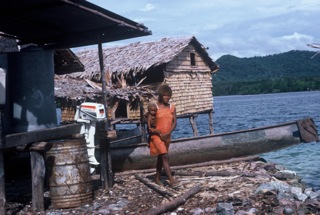Story of the Last Ramo and his Bid to Power via the Giant Canoe
In 1988, Kumuli is the last ramo in the final generation of the Fanalei chiefly clan to create a ramo—demanding inheritance of the berserk propensity as well as the custom initiation. Kumuli is seeking to build up his political prestige in the Passage through the custom channels of “saving people” with his new enormous dugout for which he has purchased one of the still relatively rare outboard motors.
 One day on their clan land in the mainland rainforest, his wife, Tama, accidentally comes across a felled giant tree that lies half hollowed out into another dugout. Kumuli flies into the ramo custom rage, finding the responsible clan and commanding them to abandon the giant, leaving it to rot. Kumuli has forbidden them access to the tree that threatens his own canoe meant to establish his base of economic and social political power.
One day on their clan land in the mainland rainforest, his wife, Tama, accidentally comes across a felled giant tree that lies half hollowed out into another dugout. Kumuli flies into the ramo custom rage, finding the responsible clan and commanding them to abandon the giant, leaving it to rot. Kumuli has forbidden them access to the tree that threatens his own canoe meant to establish his base of economic and social political power.
Although the other clan must obey Kumuli's order because of land rights, they circumvent his intention by purchasing one of the large fiberglass canoes from the government’s new fiberglass canoe-building program. Fiberglass--like nylon for nets--opens up a cash-based option for attaining power via ownership. Few in the land-poor clans can afford the $2,000 price tag for this manufactured “cargo” alternative to owning giant trees, but several wage-earning village teachers can purchase these modern canoe alternatives instead.
The design, however, is an orange fiberglass with covered bow, elongated body and straight-backed stern that is completely incompatible with paddling and net-fishing. Compared to dugouts that have the flexibility to be either paddled or motorized, the fiberglass canoe needs an outboard engine. In a place outboards perpetually “bugger up”--break down--in the salty, reef-ridden Passage environment with minimal maintenance, this is a serious handicap. Mechanics are rare and spare parts scarce, so most engines remain out of commission for long periods of time. Kumuli ironically is one of the few villagers trained as a mechanic during his years away from home.
Fiberglass canoes, when the motor is running, can bring political and financial rewards to the owner who undertakes all the social service tasks that “save people”. Except for alata net-fishing, fiberglass canoes disassociate the act of “saving people” from the act/fact of being in a dominant land-rich clan. Fiberglass canoes and nylon nets come from cash-based social political-economic "civilization", diminishing the power of owning alata and land with giant trees.








